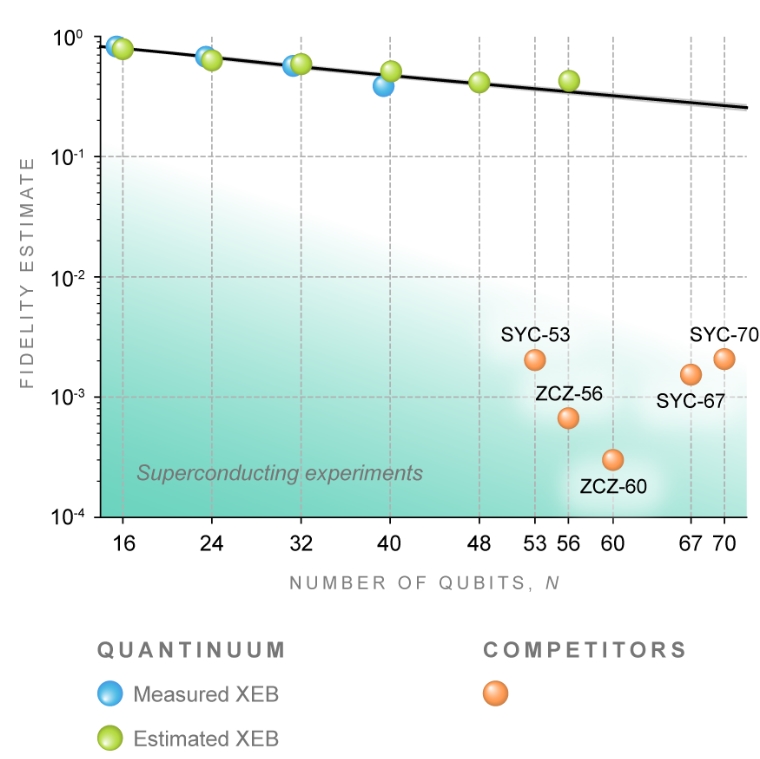Computing
Building Blocks For Quantum Internet Coming Into Focus?
Securities.io maintains rigorous editorial standards and may receive compensation from reviewed links. We are not a registered investment adviser and this is not investment advice. Please view our affiliate disclosure.

Building Blocks of the Quantum Internet Are Emerging
Quantum computing is making great progress in various subsections of the technology, from increased qubit count to better possibilities of developing quantum networking, an entirely new state of matter, an operating system for quantum networking, and even finding the first use cases in AI training.
One other field that requires attention is the development of quantum light sources. This is the type of light that is emitted in a way that results in the production of an entangled pair of photons, and only that. Entangled particles remain interacting with each other even when separated, resulting in the transfer of quantum properties.
This entanglement will be crucial for networking quantum computers, as only a quantum light source can carry quantum data from one computer to the other.
So far, reliable quantum light sources have been difficult to create. One option could be the creation of nonlinear optics, with high-yield non-linear optics recently developed by researchers at the University of Illinois.
Another option is to rely on semiconductor gallium nitride, already used on chips and lasers, although this is still a work in progress.
A new promising option is now opening, using the rare earth element erbium, with the EQUAL initiative (Erbium-based silicon quantum light sources) developed by a German-Danish collaboration involving the Helmholtz-Zentrum Dresden-Rossendorf (HZDR) and the Technical University of Denmark (DTU).
Why Erbium Matters for Quantum Networking
Erbium is a rare earth element (atomic number 68), mostly used for its fluorescent properties.
Modified erbium glasses or crystals are used as a laser optical amplifier for signals transmitted by fiber optics. It is also useful in lasers used in surgery and dentistry (Er:YAG laser), as it creates a powerful but very superficial application of laser energy.
Erbium is mostly produced from rare earth-rich mineral ore, often associated with thorium-rich deposits.
While erbium's ability to emit light should make it an ideal light source for quantum applications, it has so far not been really possible, as erbium does not react strongly enough to stimulation by light. So in the forms it is currently made, too much of the quantum information would be lost between the light source and the quantum chips and memory.
“One of the toughest goals is to integrate quantum light sources with quantum memories. This seemed unrealistic just a few years ago, but now we see a path forward.”
Søren Stobbe – Professor at the Technical University of Denmark (DTU)
How Nanophotonics Unlock Erbium’s Quantum Potential
This is where the research at the Technical University of Denmark has made a breakthrough. They developed a new nanophotonic technology that can make erbium a lot more reactive to light.
The method merges erbium light emitters with commercially fabricated nanophotonic silicon devices.

Source: HZDR
This opened the way for long-lived quantum memories that can be fabricated on a wafer-scale using CMOS technology.
“We intend to use advanced ion beam techniques to implant erbium atoms into tiny silicon structures and study how using ultra-pure silicon can improve their performance.”
Dr. Yonder Berencén – Professor Institute of Ion Beam Physics and Materials Research at HZDR.
These quantum systems can be used for a variety of applications besides quantum networking and telecommunications, notably integrated photonics with extremely low power consumption, and new nanofabrication methods.
The technological vision is based on combining nanophotonic chips from DTU with unique technologies in materials, nanoelectromechanics, nanolithography, and quantum systems. There are many different types of quantum light sources today, but either they do not work with quantum memories, or they are incompatible with optical fibers.
Søren Stobbe – Professor at the Technical University of Denmark (DTU)
Real-World Applications of Erbium-Based Quantum Light
The most important applications of these projects will be in networking quantum computers, as using erbium makes it compatible with the same light wavelengths used in fiber-optic communication.
As a normal network of optical fiber was recently demonstrated to be usable to carry quantum information at the same time as normal telecom data flow, the ability to use the preexisting optical fiber infrastructure will be important for making the quantum network economically viable.
This research will lay the foundation for building quantum devices that can be integrated into today’s technology.”
Dr. Yonder Berencén – Professor Institute of Ion Beam Physics and Materials Research at HZDR.
This research was done with support and equipment provided by Beamfox Technologies ApS (nanotechnology) and Lizard Photonics ApS (integrated photonics).
Investing in Quantum Computing
Honeywell / Quantinuum
Honeywell International Inc. (HON +1.14%)
Quantinuum is the result of the merger of Honeywell Quantum Solutions and Cambridge Quantum.
Honeywell remains the company's majority shareholder (likely 52% ownership) after a fundraising round valuing it at $5B. Founder Ilyas Khan is reported to own approximately 20% of the company. Other shareholders include JSR Corporation, Mitsui, Amgen, IBM, and JP Morgan.
A potential IPO of Quantinuum in the future, potentially as a part of a larger corporate restructuring, is estimated to be worth as much as $20B and might occur between 2026 to 2027.
Quantum computing is not the central part of Honeywell's business, more centered around products in aerospace, automation, and specialty chemicals & materials.
Each of these domains might, however, benefit from quantum computing, especially computational chemistry, and quantum cybersecurity, potentially giving Honeywell an advantage against its competitors.
The company's main model for now is the H2, a trapped-ion 56 qubits chip, with 99.895% two-qubit gate fidelity.
The company has pursued high-quality computing with very little error more than adding as many as possible qubits, creating a so-called “fault-tolerant quantum computing”.
This approach is labeled by the company “Better qubits, better results”, with a similar amount of qubits achieving 100-1,000 fold more reliable results.

Source: Quantinuum
This notably could make a difference in urgently needed quantum-resistant cryptography, with defense company Thales (HO.PA -0.96%) already collaborating with Quantinuum as well as the international banks HSBC and JP Morgan.
Quantinuum also offers its proprietary quantum computational chemistry InQuanto, usable for pharmaceuticals, material sciences, chemicals, energy, and aerospace applications.
Like many other quantum computing companies, Quantinuum offers Helios, a “hardware-as-a-service”, allowing users to benefit from quantum computing without having to deal with the complexity of operating the system themselves.
Quantinuum signed in November 2024 a partnership with German Infineon, Europe’s largest semiconductor manufacturer. Infineon will bring its integrated photonics and control electronics technology to help create the next generation of trapped-ion quantum computers.
As integrated photonics and quantum networks are moving closer to practical use cases, it becomes now clear how important this partnership might be for the future of Quantinuum.
At this point, it seems that the next step for the company will be to release the world's first AI-focused photonics-quantum chip.
In the coming months, Quantinuum will share results from ongoing collaborations, showcasing the groundbreaking potential of quantum-driven advancements in Generative AI.
The innovative Gen QAI capability will enhance and accelerate the use of Metallic Organic Frameworks for drug delivery, paving the way for more efficient and personalized treatment options, with details to be unveiled at the launch of Helios.
The announcement in this publication is part of a string of news related to the quick progress of the AI-quantum computing connection made at Quantinuum.
More ongoing use cases could strongly boost the future value of the company, and therefore, Honeywell’s stack in it and the potential profit investors could make from it.














